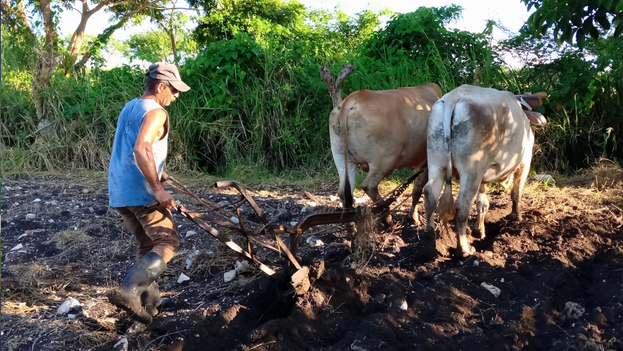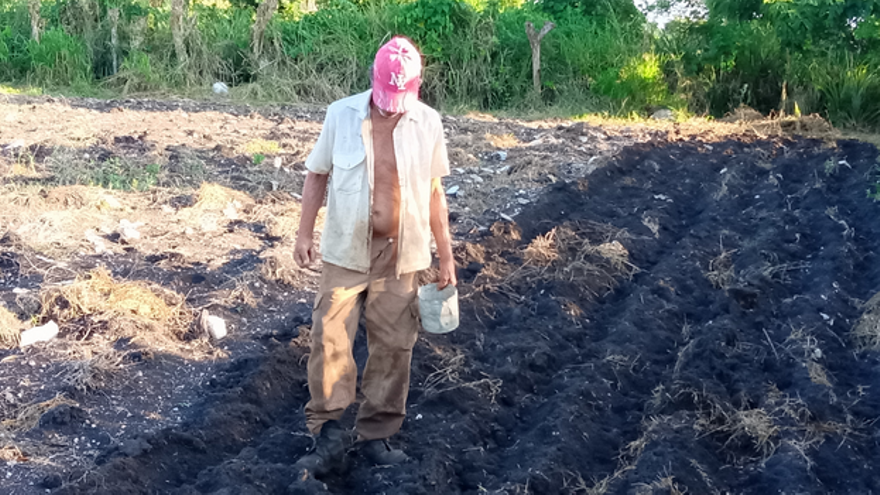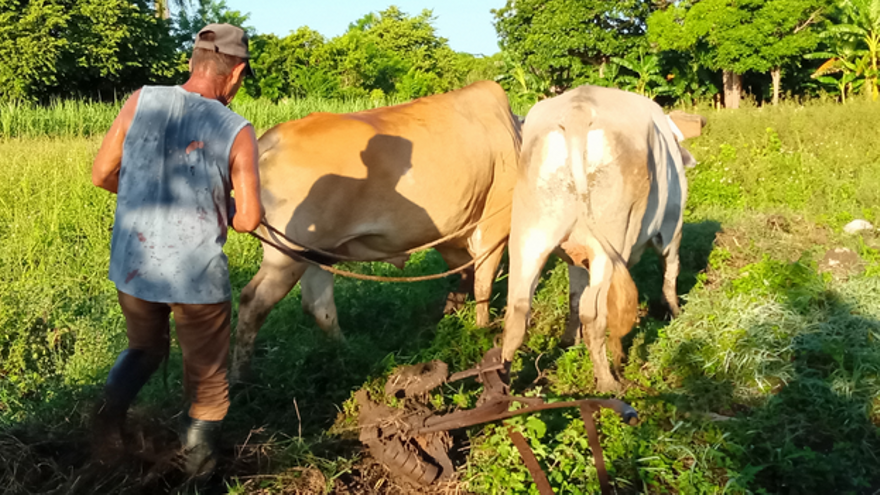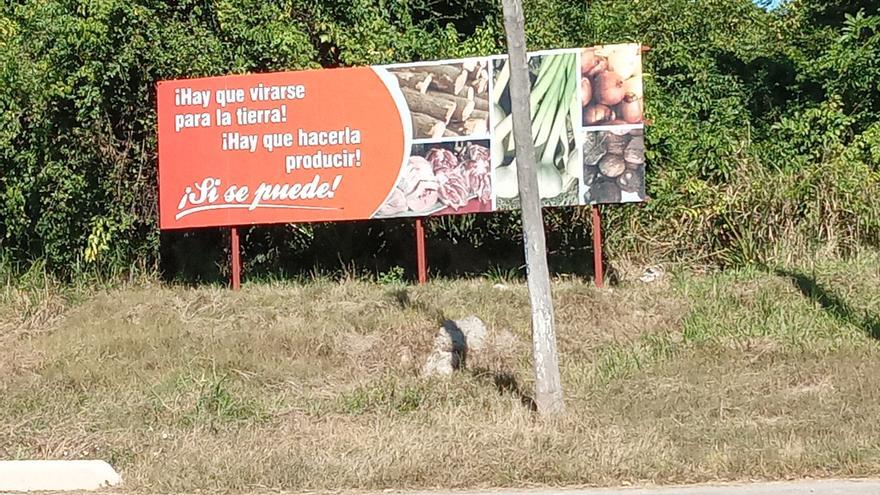
![]() 14ymedio, Yankiel Gutiérrez Faife, Camajuaní (Cuba), 24 September 2022 — Like most Cuban farmers, Ernesto gets up before dawn and has coffee. Half of his house is made of boards; the other is covered with fiber cement. He isn’t poor, but the money he earns has to be reinvested in crops.
14ymedio, Yankiel Gutiérrez Faife, Camajuaní (Cuba), 24 September 2022 — Like most Cuban farmers, Ernesto gets up before dawn and has coffee. Half of his house is made of boards; the other is covered with fiber cement. He isn’t poor, but the money he earns has to be reinvested in crops.
His land, located on the outskirts of Camajuaní, Villa Clara, used to be fertile and welcoming. But it has been dry for years and doesn’t produce unless it’s fertilized with expensive fertilizers, sprayed with insecticides and weeded. “When you can’t get these resources,” the farmer tells 14ymedio, “the harvest is lost.”
Ernesto wants to grow 15 bean plants. Between the payment of the workers, the plow and the liquids, he has to spend 25,000 pesos on planting. A small fortune that took him three months to gather, in addition to getting used to remote management through Revolico, the buying and selling website where he got six liters of the herbicide glyphosate, for 1,675 pesos each.
The driver of the tractor that had planned to drag the plow charged him 6,000 pesos, plus fuel money, another 2,200. “All I have been able to achieve has been with my money, without credits or loans,” says Ernesto. “And I haven’t even been able to start planting with that.”
“What’s lucky is that I sell almost everything from what I produce,” he concludes, “and I also have something left for my house. If not, I have nothing.”

A few kilometers from Camajuaní, on a farm in the town of La Sabana, Armando grows mangoes and guavas that he then sells to Acopio. This State company distributes them to the Los Atrevidos canning factory, in Remedios. “The people of Acopio seemed serious,” he says, “until one day they really let me down.”
Armando planned to send six boxes of ripe mango, and they kept waiting for him all weekend. Under the heat of August, some mangoes began to rot. “I couldn’t wait any longer,” says the guajiro, who had to sell the lot to a merchant from Camajuaní, who quickly dispatched it.
“When I called Acopio to complain, they shamelessly explained to me that without fuel for the trucks they couldn’t buy the mango,” he says. “With that level of instability, how can you trust the State to do business?”
Miguel also lives and works in Camajuaní but, unlike Ernesto and Miguel, his resources are very scarce to keep his crops in good condition. Lately he doesn’t even sell what he harvests, but dedicates it to the consumption of his own family.
Old and with ailments, Miguel depends on his squalid checkbook. “It doesn’t give me enough for insecticides,” he laments. He has tried to thrive with other alternatives: earthworm hummus, animal feces and a mixture made with tobacco wedges and rotten vegetables, “but even so the pests don’t give up.”

Bordering on extreme poverty, Miguel’s house doesn’t even have a bathroom, just a toilet of boards in the courtyard. Despite the poverty and the impossibility of making profits in dollars, the Government continues to sell agricultural inputs in foreign currency. Most farmers don’t have or don’t know how to apply for a freely convertible currency account. These are very new processes, modes of payment to which they aren’t accustomed and a suffocating bureaucracy that turns marketing into a nightmare.
Some of them, the wealthiest, have been able to hire laborers and equipment. Others follow the tradition of facing the countryside alone, from sunrise to sunset, and resign themselves to austerity and the departure of the children, who rarely remain in rural villages.
Ernesto, Armando and Miguel are not affiliated with any cooperative. Rarely does the State pay attention to them when they complain to farm agencies, and the resources never arrive on time. “What there is goes to State producers,” they’re told.

It’s not strange that these three men, accustomed to difficulties and bureaucracy, have been perplexed by a recent headline in the the Communist Party newspaper Granma, which spoke of another Camajuaní producer: “If Yusdany can, why can’t others?” said the paper, citing none other than Miguel Díaz-Canel.
The plump president, on an official visit to the town of Villa Clara, had gone to the brand-new private “slaughterhouse” of Yusdany Rojas, a 31-year-old farmer. Rojas feeds the huge amount of 800 pigs on his farm, while he sows tobacco to sell to those who remove the veins of the leaves. In addition, he grows cane and other crops on its land and has space for a “small” sausage factory.
Díaz-Canel is portrayed with the young Yusdany, fascinated by the growth of the pigs and the “self-management” of the farm, where problems don’t take their toll. “He needs land,” says Granma, so that the local bureaucracy feels pressured in the face of the dilemma: the five pieces he owns are no longer enough.
“We were used to the State giving us everything for a long time as if we were pigeons,” he says, and his words almost sound ironic, “but now they have freed our wings and what we have to do is learn to fly.”
Yusdany sells his products to tourism and State-owned companies. The bank is lavish when it comes to granting loans, and the pigs are in good health. “Very soon I will have 3,800 pigs,” Rojas promises, and no one doubts it.
Almost 4,000 pigs, 86 employees, 5 pieces of land that will soon multiply and the personal blessing of Díaz-Canel. The president has a special affection for Camajuaní, and it’s not enough for him to pave the way for the well-shod mafia, omnipotent in the territory. Now he also guarantees that “chosen” farmers, such as Rojas, will prosper and entertain them in the official media.
Ernesto, Armando and Miguel ask themselves the same question, which becomes a complaint: If Yusdany can do it, why can’t we?
Translated by Regina Anavy
____________
COLLABORATE WITH OUR WORK: The 14ymedio team is committed to practicing serious journalism that reflects Cuba’s reality in all its depth. Thank you for joining us on this long journey. We invite you to continue supporting us by becoming a member of 14ymedio now. Together we can continue transforming journalism in Cuba.
